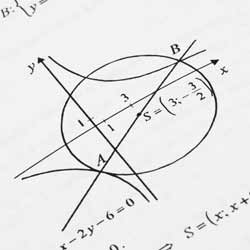Mathematician Careers
When most people think about math, they think about arithmetic, geometry, algebra, calculus, or some other math course they took in high school or college. But math has many applications, especially if you’re a mathematician.
Being a mathematician takes the world of math to the next level. Maybe you’ve heard of Newton, Einstein, Galileo, Archimedes, Riemann, or Hilbert? These famous mathematicians have solved mathematical problems that have help to shape and change the world as we know it.

Math is the use of numbers and symbols to measure quantity, structure, space, change, growth and motion. Mathematicians apply math theories to a variety of fields in order to conduct research and solve problems. When mathematical techniques, methods, principles, and strategies are applied and tested, they can have a major impact on businesses, industries, and individuals.
Math is an essential component of every industry. Mathematicians can work in space exploration, economics, education, physics, social science, business, medicine, casinos, technology, security, robotics, defense, communications, and even animation. It can be used to do a wide variety of things. A mathematician may evaluate the effectiveness of wind deflectors, determine the most efficient transportation routes, disprove a mathematical theory, produce video games, create computers, optimize search engines, or design the communication technology behind the latest smartphone. The opportunities are endless.
Mathematicians spend their days in an office working with numbers and computers. They analyze data, apply it to problems, solve those problems, develop and test theories, create models to interpret data, and prepare reports. Their findings can be used to advance technology, support business decisions, make conclusions on data, and prove or disprove theories. Depending on their interests, a mathematician can pursue one of two main routes – applied mathematics or theoretical mathematics.
Theoretical, or pure, mathematics is the advancement of the field of mathematics. This niche explores theories and laws, challenges current knowledge, and tests unexplainable issues. Theoretical number crunchers focus on geometry, calculus, chaos theory, complex numbers, ratios, or algebra. Theoretical mathematicians will most likely work at universities, colleges, or research firms.
On the flip side is applied mathematics. Applied mathematics uses math principles, theories, and models to solve practical problems. These mathematicians use numerical data and apply it to fluid dynamics, optimization, probability theory, statistics, cryptography, game theory, or economics. They seek patterns where real world data aligns with mathematical models, as this can help them solve problems. Applied mathematicians will usually find work in the private sector or with the federal government.
To become a mathematician you need to take math courses. A master’s degree in mathematics is required for most jobs, but there are some entry-level jobs that only require a bachelor’s degree. It’s important to read journals, attend conferences, and stay on top of the latest trends and newest developments because mathematics is a constantly evolving niche. A successful mathematician may even want to try to solve one of Hilbert’s Problems or the Millennium Prize Problems. These mathematical problems have stumped mathematicians for years.
According to the BLS, mathematicians typically make $101,360 per year or $48.73 per hour. Currently there are about 3,500 mathematician jobs in the US, but the field is expected to grow by 23% in the near future. There are nationwide job opportunities for mathematicians with universities, research companies, governments, and the private sector.
Without math our world would be very different. If you have a natural numerical talent, become a mathematician. It’s a cool job.
Quick Facts About Mathematician Careers
Job Title: Mathematician
Office: Office based job
Description: Apply mathematical theories to solve problems
Certifications/Education: Bachelor’s or Master’s degree in mathematics
Necessary Skills: Extensive knowledge of mathematics
Potential Employers: Private Sector, Federal Government, Research Companies, Universities
Pay: $101,360 per year or $48.73 per hour
Helpful Mathematician Employment Links:
- Search Mathematician Jobs on JobMonkey
- Mathematical Association of America
- American Mathematical Society
- Society For Industrial And Applied Mathematics
- National Council of Teachers Of Mathematics
- Bureau of Labor Statistics: Mathematicians
- Association of Women In Mathematics
- Famous Mathematicians
- What Do Mathematicians Do?
- WeUseMath.org

